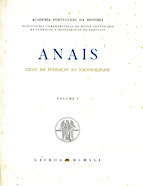

................................
Although it would be impossible to mention all of the studies, it is worth highlighting the vast array of themes addressed in these narratives, which included articles on Brazil, Angola, and Mozambique; astronomy and cartography from the Age of Discoveries; Portuguese military history (campaigns, weaponry, and defence systems); the role of the treasury, coin minting, and economic and financial matters; the influence of jurists and legal experts in society and politics; cultural topics (pamphlets, comedy, etc.); the Inquisition and religious practices; and private correspondence between various entities, among many others. The increased interest in historically diverse subjects and fresh examinations of certain documents and iconographies has proven productive, although the modi operandi remain largely unchanged, particularly with the continued reliance on chancellery documents, chronicles, diaries, and similar sources. Factual history with a positivist approach certainly predominates.
The second cycle of the Anais was published between 1946 and 2003, though this analysis concludes with the year 1973, encompassing a total of 22 volumes. Unlike the first series, which was associated with a centenary celebration, this cycle covers a broader range of historical fields, allowing for a more global perspective across various time frames. While the modern period is prominently represented by topics related to the Portuguese Empire, the discoveries, notable monarchs of the second dynasty, and some contemporary themes (including the APH itself), Portuguese medievalism remains the most studied period in this series. The abundance of articles focused on this era reflects a strong fascination with it. In terms of methodology, this cycle continues the approach of the first series by drawing on diverse areas of study to construct the historical narratives, with particular attention to diplomatic, economic, political, military, institutional, nautical, social, medicinal, and religious themes, among others. It is also noteworthy that these studies contain a distinct ideological influence, both politically and socially, which aligns closely with the values and doctrines of the Estado Novo . This alignment reinforced certain principles that the regime regarded as steadfast and indisputable— concepts that are distinctly of their time.
This work is financed by national funds through FCT - Foundation for Science and Technology, I.P, in the scope of the projects UIDB/04311/2020 and UIDP/04311/2020.
